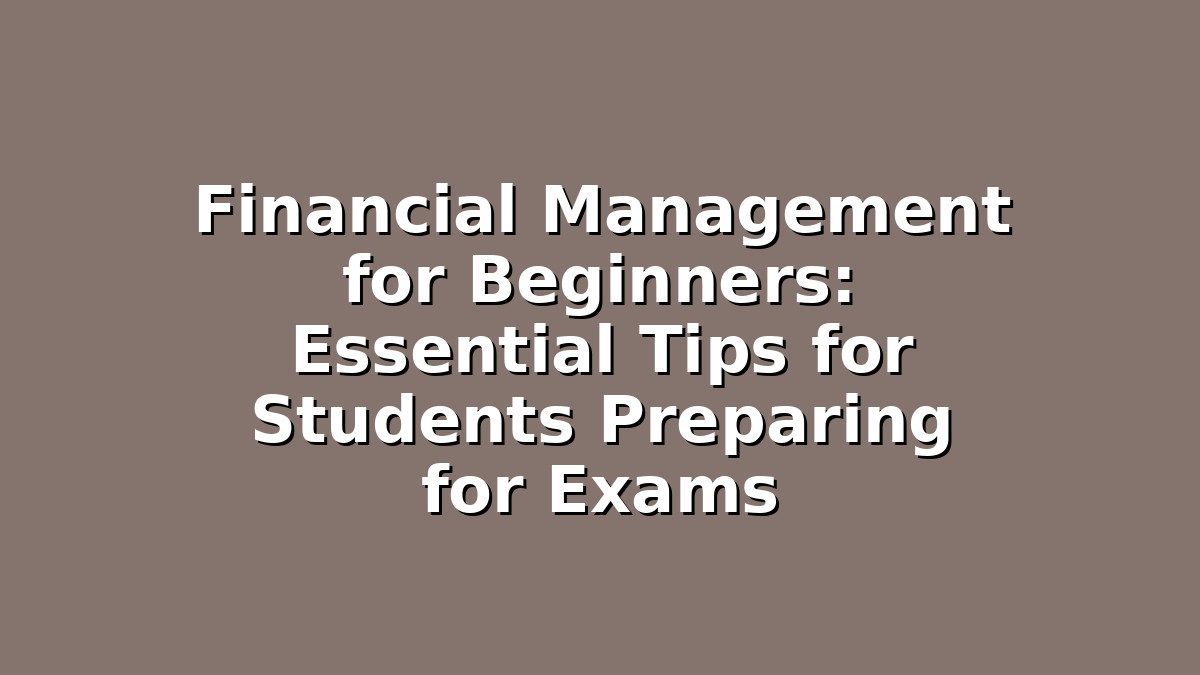Managing your finances effectively is a crucial skill that can greatly reduce stress and help you focus better on your studies. For students preparing for exams or looking to improve their study habits, understanding the basics of financial management can lead to a more balanced life, allowing you to allocate resources wisely, avoid unnecessary distractions, and invest in your academic success. In this article, we’ll explore practical financial management tips tailored specifically for students, so you can build healthy money habits while preparing for exams.
1. Create a Realistic Budget That Supports Your Study Goals
One of the first steps to good financial management is establishing a budget that aligns with your priorities as a student. Your budget should reflect your income (from part-time jobs, scholarships, or allowances) and your essential expenses, with a clear focus on supporting your study needs.
How to budget effectively as a student:
– Track your spending: Start by recording all your income and expenses for a month. Use apps like Mint or a simple spreadsheet to categorize your expenses—such as food, transportation, study materials, and entertainment.
– Prioritize essential expenses: Allocate funds first to necessities that directly impact your study environment and well-being. This includes textbooks, stationery, internet access, and healthy meals.
– Limit discretionary spending: While it’s important to take breaks and relax, cutting back on non-essential expenses like frequent dining out or entertainment subscriptions can free up money for more productive uses.
– Set aside “exam prep” funds: Allocate a portion of your budget specifically for exam preparation—this might be for purchasing study guides, attending review sessions, or investing in online courses.
Remember, a budget isn’t meant to restrict you but to help you make smarter choices that support your academic goals. Keeping your finances in check can reduce anxiety and allow you to channel your energy towards studying.
2. Manage Time and Money Together: Invest Wisely in Your Study Tools
Time is a valuable resource during exam preparation, and managing it effectively goes hand in hand with managing money. Sometimes, spending money wisely on the right study tools can save you significant time and boost your productivity.
Smart investments for exam success:
– Buy or rent used textbooks: New textbooks can be expensive. Look for used copies online, rent textbooks, or use digital versions to save money.
– Utilize free resources: Many universities offer free access to online journals, libraries, and study groups. Public libraries and educational websites also provide quality materials at no cost.
– Invest in productivity tools: Consider purchasing apps that help with time management and focus, such as Pomodoro timers, task managers, or note-taking apps. Sometimes, a small fee for an effective tool can save hours of wasted time.
– Create a comfortable study space: If possible, invest in ergonomic chairs, good lighting, or noise-cancelling headphones. These small investments can improve concentration and reduce fatigue during long study sessions.
Balancing your time with smart financial choices ensures that your study environment and materials are optimized without straining your budget. Remember, every dollar spent should facilitate your learning and overall exam performance.
3. Build Emergency Savings and Avoid Debt to Stay Stress-Free
Unexpected expenses can catch any student off guard—whether it’s a medical bill, urgent travel, or last-minute study supplies. Having an emergency fund and managing debt responsibly are essential parts of financial management that can keep your focus on exams rather than financial worries.
Tips for building financial resilience:
– Start small with savings: Even saving a small amount each week or month can build a cushion over time. Aim to save at least $5-$10 regularly, using a separate savings account if possible.
– Avoid credit card debt: Credit cards can be tempting, but accumulating debt often leads to high-interest charges that add financial pressure. Use credit cards only for planned purchases and pay off the balance each month.
– Use student discounts and deals: Many stores and online platforms offer discounts for students. Take advantage of these to reduce costs on essentials.
– Seek financial advice if needed: If you feel overwhelmed, don’t hesitate to reach out to campus financial advisors or counselors. They can provide personalized strategies to manage your finances and reduce stress.
By building savings and avoiding unnecessary debt, you create a safety net that allows you to focus on your studies without the distraction of financial emergencies or burdens.
Conclusion
Financial management might seem unrelated to exam preparation, but the truth is that money worries can significantly impact your concentration and motivation. By creating a realistic budget, investing wisely in your study tools, and building financial resilience through savings and debt management, you set yourself up for a more focused and stress-free exam period. Remember, these skills take time to develop, so start small and stay consistent. Your academic success is not just about what you study, but also how you manage your life—including your finances. Stay positive, stay organized, and watch your study efforts pay off both academically and financially!

Responses